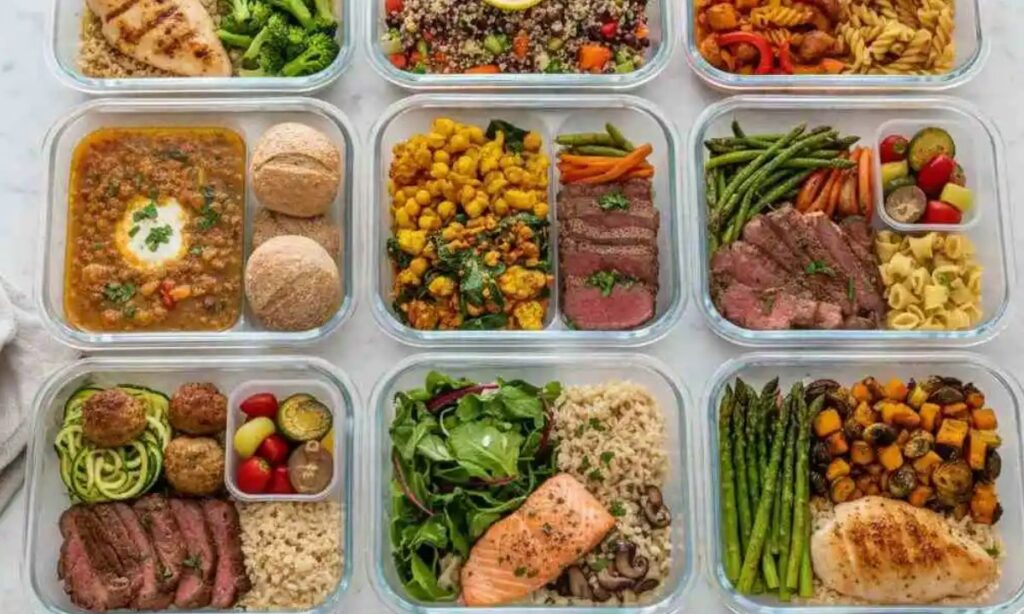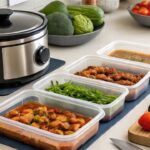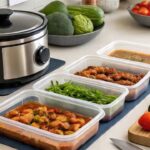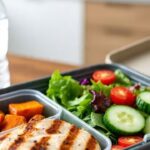Meal prep is one of the most effective ways to save time, eat healthier, and cut down on food waste. Whether you’re a beginner or a seasoned cook, mastering meal prep can transform your weekly routine. In this article, we’ll explore 10 essential tips for successful meal prep, along with helpful tables, FAQs, and actionable bullet points.
1. Plan Your Meals in Advance
Planning is the foundation of successful meal prep. Create a weekly menu, considering your dietary goals, schedule, and ingredient availability.
Quick Tips:
- Decide on recipes for breakfast, lunch, and dinner.
- Check your pantry before shopping.
- Plan around seasonal produce for freshness and cost savings.
2. Make a Detailed Grocery List
A clear grocery list saves time and prevents overspending.
Benefits of a Grocery List:
- Reduces impulse buying.
- Ensures you have all ingredients for your planned meals.
- Keeps your shopping trip organized and faster.
3. Invest in Quality Containers
Good containers keep your meals fresh and organized.
Container Tips:
- Use BPA-free or glass containers for safety.
- Opt for compartmentalized containers to separate foods.
- Label each container with dates to track freshness.
4. Batch Cook Core Ingredients
Cooking key ingredients in bulk simplifies meal assembly.
Examples of Core Ingredients to Batch Cook:
- Proteins (chicken, tofu, eggs).
- Whole grains (rice, quinoa, oats).
- Vegetables (roasted or steamed).
5. Keep Meals Balanced
Every meal should include a healthy mix of macronutrients.
| Macronutrient | Examples | Benefits |
|---|---|---|
| Protein | Chicken, beans, tofu | Supports muscle growth and repair |
| Carbohydrates | Brown rice, quinoa, whole wheat pasta | Provides sustained energy |
| Healthy Fats | Avocado, olive oil, nuts | Promotes heart health and satiety |
| Fiber | Vegetables, legumes, fruits | Improves digestion and fullness |
6. Use Freezer-Friendly Recipes
The freezer is your best friend in meal prep. Choose recipes that freeze well without losing flavor or texture.
Freezer-Friendly Foods:
- Soups and stews.
- Cooked proteins.
- Pre-chopped fruits for smoothies.
7. Prep Vegetables in Advance
Washing, chopping, and portioning vegetables ahead of time makes cooking much faster. Store them in airtight containers or zip bags to maintain freshness.
8. Rotate Recipes to Avoid Boredom
Eating the same meals repeatedly can get dull. Switch up your proteins, spices, and cooking methods to keep things exciting.
Ideas:
- Try themed weeks (Mediterranean, Asian, Mexican).
- Experiment with sauces and marinades.
- Introduce new vegetables or grains.
9. Label and Date Everything
Proper labeling prevents confusion and food waste.
| Label Info | Why It’s Important |
|---|---|
| Date Cooked | Tracks freshness and safety. |
| Meal Name | Makes it easy to identify contents. |
| Reheating Instructions | Helps family members or roommates know how to heat it properly. |
10. Schedule Prep Time
Dedicate a specific day and time for meal prep each week. Treat it like an appointment to ensure consistency.
Best Days for Meal Prep:
- Sunday: Start the week organized.
- Wednesday: Mid-week prep for fresh meals.
Bonus Tips
- Keep your kitchen organized with labeled pantry items.
- Cook with versatile spices to enhance flavor.
- Involve family members to save time and make it fun.
FAQs
Q1. How long can meal-prepped food last in the fridge?
Most cooked meals last 3–4 days in the refrigerator if stored properly in airtight containers.
Q2. Can I freeze meal-prepped salads?
It’s best to freeze only the proteins or grains from salads and add fresh greens later to avoid sogginess.
Q3. What’s the best way to reheat meal-prepped food?
Reheat gently using a microwave, stovetop, or oven. Add a splash of water or broth to maintain moisture.
Q4. How do I prevent meals from tasting bland?
Use herbs, spices, marinades, and sauces to enhance flavors. Prepare sauces separately to keep meals interesting.
Key Takeaways in Bullet Points
- Plan your meals and make a grocery list before shopping.
- Use quality containers to store food safely.
- Batch cook proteins, grains, and veggies.
- Freeze meals for longer storage.
- Rotate recipes to keep things exciting.
- Label everything with names and dates.
- Dedicate a specific prep day for consistency.
By following these 10 essential tips for successful meal prep, you’ll save time, reduce stress, and enjoy healthier, tastier meals all week long.





